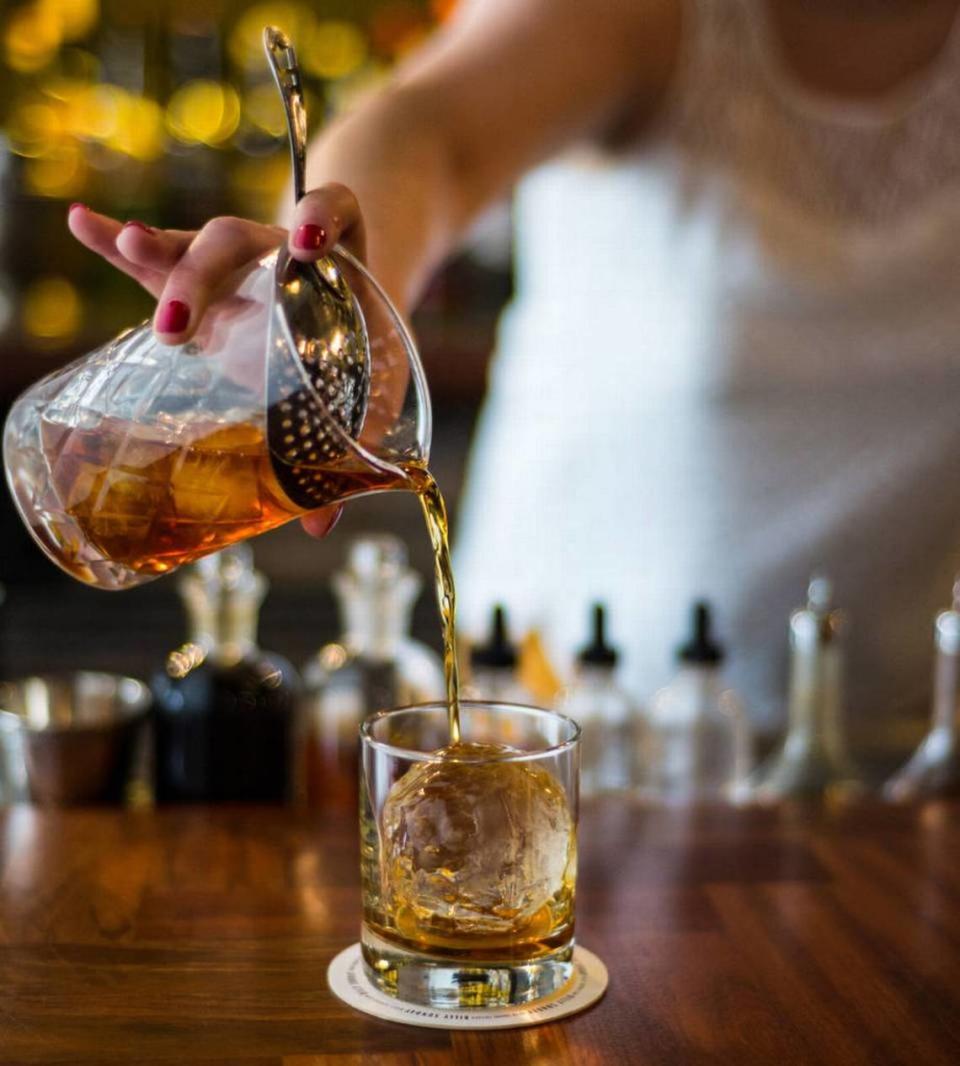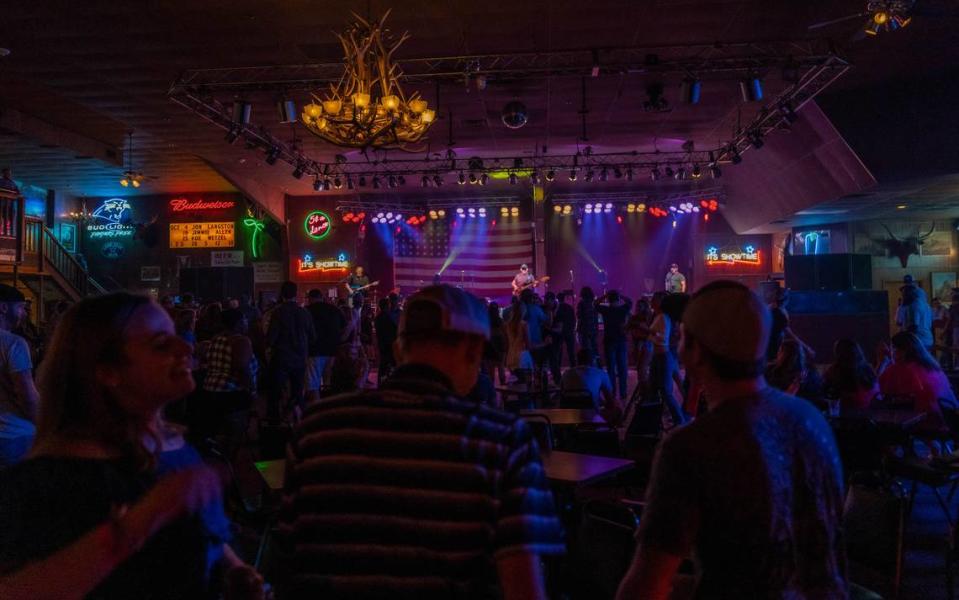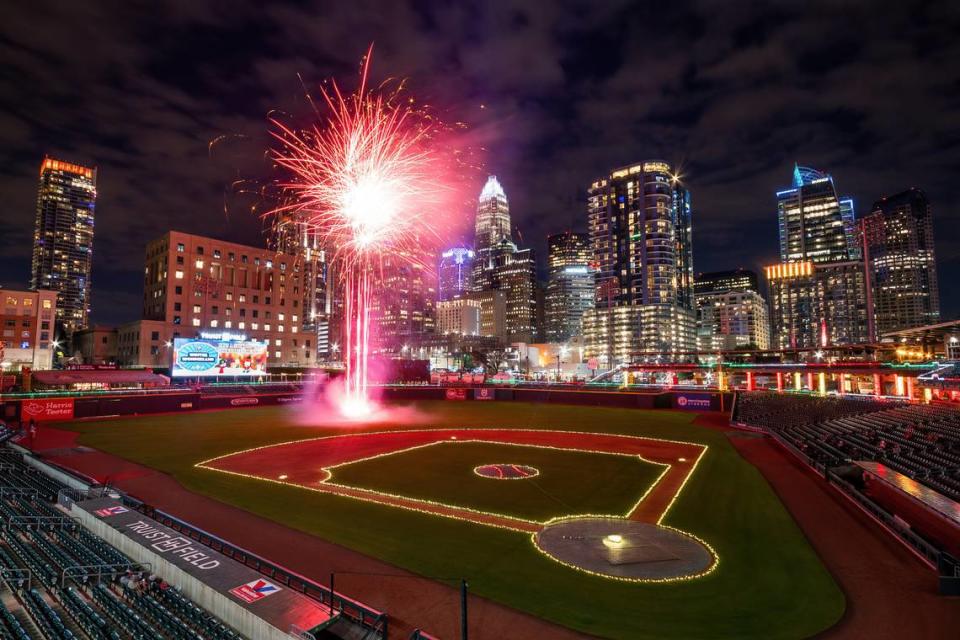‘A huge deal.’ Charlotte area bars, restaurants, sports sites cheer looser COVID rules
Listen to our daily briefing:
Subscribe: Apple Podcasts | Spotify | Amazon Alexa | Google Assistant | More options
Charlotte bars and restaurants were feeling major relief Wednesday, following Gov. Roy Cooper’s announcement he is allowing bars to start serving people inside again and extending late-night alcohol sales.
Other groups are exulting as well, with Cooper easing restrictions on outdoor amphitheaters and concert venues as well as high school, college and pro sports sites.
The latest moves come as Charlotte and North Carolina are seeing COVID-19 metrics continue to stabilize since the start of the year, and over 1 million people have received at least one vaccine dose.
“We’re excited. I think the bar community, in general, will feel a big sigh of relief,” said Larisa Yanicak, beverage director for Backstage Lounge at Southbound on South Boulevard.
The order takes effect Friday at 5 p.m. and lasts until March 26.
Under the updated executive order:
▪ The alcohol sales cutoff at restaurants and bars will be extended from 9 p.m to 11 p.m.
▪ Bars, nightclubs and adult entertainment venues will be able to open indoors at 30% capacity or 250 people, whichever is less. Bars and nightclubs had been allowed to operate at 30% capacity outdoors only.
▪ Indoor theaters, amphitheaters, music halls, arenas and other live performance venues can now increase capacity from 25 people to 30% capacity or 250 people, whichever is less.
▪ Outdoor amphitheaters and concert venues can reopen at 30% capacity. That would be welcome news for places like PNC Music Pavilion in north Charlotte.
▪ There are 50% capacity restrictions on businesses and retail establishments, including restaurants, breweries and wineries, retail, gyms, museums, aquariums, barbers and personal care venues, pools and outdoor amusement parks.
▪ The statewide curfew for all non-essential travel between 10 p.m. to 5 a.m. also is expiring.
▪ More spectators will be allowed at high school, college and pro sports events. The number allowed will depend on the venue size. Arenas with a capacity of as many as 5,000 people will be able to open with up to 15% capacity, as long as they follow safety protocols.
The latest stay-at-home order was set to expire Sunday. This is the fifth time North Carolina’s Phase 3 coronavirus restrictions have been extended in some form since Oct. 2, even as COVID-19 vaccinations are underway.
“We have reason for hope in North Carolina,” Cooper said. “All the metrics that we measure are continuing to stabilize.” He also cited the continuing vaccine rollout as a cause for optimism.
And he emphasized the need to keep wearing masks and social distancing.

‘Enjoy the experience’
Extending alcohol sales until 11 p.m. will mean less stress on bartenders, Yanicak said. The South End bar has been open only from 5 to 9 p.m. and is a small space, she said.
“We only have a short amount of time to get people in, and not shove them out the door,” Yanicak said. “It will let more people come in and try us out, and people can sit and enjoy the experience.”
Backstage Lounge is a speakeasy but Yanicak said it operates like a restaurant because it’s part of South 48 complex and sells more food than alcohol.
‘It could turn it around’
Over at Optimist Hall on North Brevard Street, extended serving hours could “make or break” The Spindle Bar and Billy Sunday, said Stephanie Andrews, who manages the two cocktail bars.
“It’s been really tough, and we depend on those late-night hours,” she said. “It’s a huge deal. It could turn it around for us.”
She said revenue during the pandemic has been down about 30% to 40% each month compared to sales a year ago at The Spindle Bar, which opened in fall 2019. The 1,450-square-foot Billy Sunday cocktail lounge opened just before the pandemic in February a year ago.
Normally, The Spindle Bar can seat about 18 people but during the pandemic has shifted mostly to to-go. Andrews said customers can take a drink and walk around Optimist Hall and also order cocktails to take home.
In December, North Carolina eased its state liquor laws to allow packaging mixed drinks for takeout. She hopes the governor will continue to allow sales of cocktails to go beyond the March 31 deadline, saying “it’s a great option for us.”
“The restrictions for us have really kind of limited what we can do for business. But we’re understanding that because we want to make sure everyone is safe and healthy,” Andrew said. “We’re going to roll with the punches, that’s the only thing we’ve been able to do so far.”
‘Any little bit helps’
Although Mimosa Grill in uptown Charlotte isn’t a nightspot, executive chef Thomas Marlow said the extended alcohol sales and curfew ending will make an impact.
“We have noticed on Saturday nights, people want to come out later,” he said. “Any loosening of restrictions is always going to be a positive, for sure.”
It will also mean being able to seat more people and not having to turn people away from the 9,000-square-foot restaurant because without the curfew, the restaurant can stay open later.
“I don’t want to jinx that we’re at the light at the end of the tunnel, it’s been a crazy 12 months, Marlow said.
It’s ‘amazing’
Cooper’s announcement also was welcome news to Jackie DeLoach, owner of Hattie’s Tap & Tavern on The Plaza.
“Having people inside is really big for us,” DeLoach said Wednesday ahead of Cooper’s announcement. “The possibility that we could be open (indoors) is amazing.”
But she added, “Why has it taken so long? ... I just want to know why we’re ignored so much.”
A burden lifted
The news of extending on-premise alcohol consumption and lifting the curfew was welcomed news for chef Bruce Moffett, who owns several local restaurants including Barrington’s, Good Food on Montford, Stagioni and Bao and Broth.
“The 9 p.m. curfew was a real burden. We effectively lost most of our second seating and saw about a 33% decline in revenue because of it,” Moffett said. “It has been very frustrating to run our business under this curfew. I am confident that as the weather gets better and customers can dine later we will see a jump in sales.”
Reopening after almost a year
Coyote Joe’s country music-themed venue on Wilkinson Boulevard will reopen Friday, co-owner Allan Presley said. The west Charlotte business has been closed since last March. ”That was a nice piece of good news on a lovely spring afternoon,” Presley said.
Presley said after Cooper’s announcement he was scrambling to call staff members and the house band. “It’s a mammoth undertaking, but I’m pretty sure we’ll be able to pull it off,” he said.

Coyote Joe’s already has safety measures in place such as adding plastic shields at the front door and bar, as well as social distancing markers.
The bar has a capacity for about 3,000 people so it will be capped at 250 under the new restrictions. “But something is better than nothing,” Presley said.
Operating safely is key
The uptown retro 1980s and ‘90s nightclub Roxbury Nightclub on West Fifth Street is making plans to try to reopen Saturday.
The Roxbury, which opened over eight years ago, hasn’t been able to serve people inside since last March. Owner Jody Sullivan said the Roxbury did reopen briefly during the pandemic with the outdoor patio seating only in October. But once the alcohol sales had to stop at 9 p.m. in November, he closed it again.
Now, he’ll be able to reopen the two-level club, plus outdoor patio, that normally has a capacity for 650 people with seating for about 200 customers under the 30% guideline.
Sullivan is adding COVID-19 safety measures like monitoring the number of people on each level, marking entrance and exit stairways and strictly enforcing the mask mandate.
“At this point, we’re happy that we can reopen but we’re operating safely, that’s the key,” he said.
Sullivan said he’ll also add seating on the dance floor. “It will be the same retro experience like always at Roxbury but not a big blowout dance party,” Sullivan said.
More sports fans seating
The newest capacity limits will impact sports venues across Charlotte.
While the Charlotte Hornets have not had any fans in attendance yet this season, they now will be able to host over 3,000 at the Spectrum Center. The arena can normally seat about 20,000 people for an NBA game. The team has not shared how many fans they are expecting to allow or when they would so.
The next Hornets home game is March 11 vs. the Detroit Pistons.
All other outdoor sports venues are allowed to have up to 30% capacity, which applies to the Charlotte Knights, Charlotte MotorSpeedway and high school sports.

For some high school sports, however, attendance will still be limited. Only 250 people are allowed indoors for gyms or other venues that seat under 5,000 people.
The new guidelines also mean the Coca-Cola 600 race events May 28-30 at Charlotte Motor Speedway will include fans at limited 30% capacity with COVID-19 safety protocols in place, the Concord speedway said in a statement.
“The energy and excitement of our fans is what fuels our sport,” said speedway General Manager Greg Walter. “While the grandstands won’t be full, being able to share this historic event with thousands of fans in person is a big step in the right direction.“
Not everyone helped
At least one small venue owner said Cooper’s announcement does little for his business.
“It doesn’t help us a whole lot, because it keeps us at (36) people,” said Joe Kuhlmann, owner of The Evening Muse.
That figure includes staff, performers and concertgoers at the indoor venue, which has a capacity of 120, he said. His venue would need “50% at least” allowed in to make it financially viable to open, he said.
COVID numbers
The update comes as the state is seeing its lowest COVID-19 related case numbers and hospitalizations since November following pandemic highs in January.
As of Wednesday, 11,074 North Carolinians have died due to the virus.
But three months into immunizations, only 55,020 residents in Mecklenburg, or roughly 5% of the population have gotten both injections of the COVID-19 shots in a county of more than 1 million people.
And as of Wednesday, roughly 97,962 first doses of COVID-19 vaccines have been administered in Mecklenburg County
The latest County Alert System shows the fewest red counties since the start of the system. The COVID-19 community alert system started in November categorizing counties into three tiers of community spread, with red being critical.
Mecklenburg County moved into the orange zone — reporting “substantial community spread.” That means Mecklenburg County is improving from late December, when the county first moved into the red zone, with “critical community spread” of the coronavirus.
Observer reporter Hannah Smoot and the (Raleigh) News & Observer contributed

